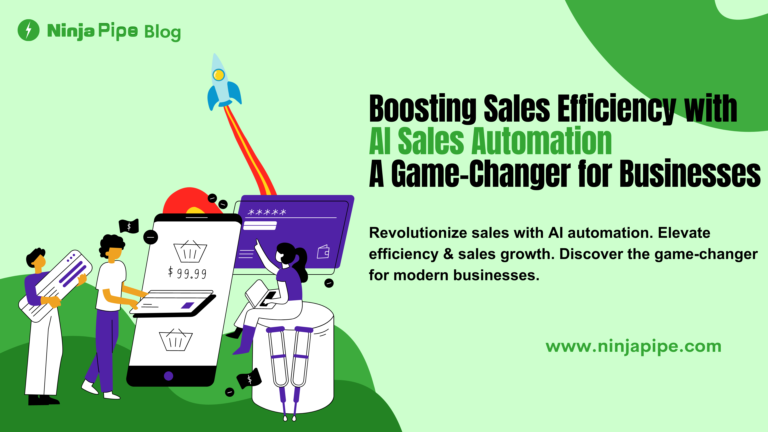Unleash sales potential with AI automation. Essential for modern businesses. Elevate efficiency, conversions, and growth.
Introduction
In today’s highly competitive business landscape, maximizing sales potential is paramount for sustainable growth and success. While traditional sales approaches remain effective, the integration of AI sales automation has revolutionized the way businesses interact with customers, streamline operations, and boost revenue. This article explores the fundamental reasons why AI sales automation is a must-have for modern businesses seeking to thrive in an increasingly digitized world.
Understanding AI Sales Automation
AI sales automation refers to the use of artificial intelligence technologies and algorithms to automate various aspects of the sales process. From lead generation and nurturing to sales forecasting and process optimization, AI-powered tools and systems bring unparalleled efficiency and effectiveness to sales teams. By leveraging AI, businesses can enhance customer targeting, personalize interactions, and gain actionable insights to drive sales growth.
Streamlining Sales Operations
One of the primary benefits of AI sales automation is the ability to streamline sales operations. Tedious and repetitive tasks, such as data entry, email outreach, and follow-ups, can be automated, freeing up valuable time for sales professionals to focus on building relationships and closing deals. With AI handling routine tasks, sales teams can operate at peak productivity, ensuring timely responses and smoother operations.
Personalization and Targeted Marketing
In the era of information overload, personalization is crucial to capturing customer attention and driving conversions. AI sales automation enables businesses to tailor their sales and marketing efforts based on individual customer preferences, behaviors, and demographics. By analyzing vast amounts of customer data, AI can deliver highly personalized interactions, offering relevant product recommendations and customized experiences that resonate with potential buyers.
Predictive Sales Analytics
AI sales automation empowers businesses with predictive sales analytics capabilities. By analyzing historical data and employing advanced algorithms, AI can identify patterns, trends, and correlations in customer behavior. These insights enable businesses to make data-driven decisions, anticipate customer needs, and align their sales strategies accordingly. Predictive analytics also enables proactive customer outreach and facilitates effective cross-selling and upselling opportunities.
Lead Generation and Nurturing
Generating and nurturing leads are vital components of the sales process. With AI-based lead generation techniques, businesses can automate the identification and qualification of potential leads, ensuring a steady flow of prospects. AI algorithms analyze multiple data points, including online behavior and engagement metrics, to identify high-quality leads. Additionally, AI-powered lead nurturing enables personalized and targeted communication, building relationships and guiding prospects through the sales funnel.
Sales Forecasting and Revenue Optimization
Accurate sales forecasting is essential for effective resource allocation, inventory management, and revenue optimization. AI sales automation utilizes historical sales data, market trends, and external factors to predict future sales with greater precision. By leveraging these forecasts, businesses can implement effective pricing strategies, optimize inventory levels, and align their resources efficiently. Data-driven sales forecasting enables businesses to make informed decisions, reducing costs and maximizing revenue potential.
Sales Process Optimization
AI sales automation drives process optimization within the sales pipeline. AI-powered systems can analyze vast quantities of data to identify bottlenecks, inefficiencies, and areas for improvement. By automating and streamlining various stages of the sales process, businesses can enhance sales conversion rates, accelerate deal closure, and reduce the overall time-to-sale. The seamless integration of AI technology with existing sales processes ensures a more efficient and effective workflow.
Overcoming Challenges and Concerns
Although AI sales automation offers numerous benefits, there are common concerns that businesses should address. It is crucial to strike a balance between technology and the human touch in sales interactions. While automation optimizes workflows, personal engagement and relationship-building remain essential for customer satisfaction. Businesses must also consider potential limitations and risks associated with AI sales automation, such as data privacy concerns, algorithmic biases, and the need for ongoing system monitoring and fine-tuning.
Choosing the Right AI Sales Automation Solution
When selecting an AI sales automation solution, businesses should consider several factors. Integration with existing systems and processes is crucial to ensure a seamless implementation and data flow. Evaluating the return on investment (ROI) and scalability of the solution is vital for long-term success. The chosen solution should align with the specific needs and goals of the business, providing the necessary features and functionalities to maximize sales potential.
Successful Implementation Strategies
Implementing AI sales automation effectively requires careful planning and execution. Businesses should provide comprehensive training and upskilling programs for sales teams to ensure they can leverage the technology efficiently. Regular monitoring and optimization of AI-driven processes are essential to maintain optimal performance. By taking a strategic and structured approach to implementation, businesses can maximize the benefits of AI sales automation while minimizing potential challenges.
Future Trends and Innovations
Looking ahead, the future of sales and business growth undoubtedly involves further advancements in AI sales automation. Emerging trends include the integration of natural language processing to enhance conversational AI, the use of AI chatbots for voice and video-based interactions, and the incorporation of AI into virtual sales assistants. As AI technology continues to evolve, businesses must stay informed and adapt to leverage AI’s full potential in maximizing sales potential.
Conclusion
In conclusion, AI sales automation is a must-have for modern businesses seeking to maximize their sales potential. By streamlining operations, personalizing marketing efforts, leveraging predictive analytics, and optimizing various aspects of the sales process, businesses can enhance productivity, improve conversion rates, and drive revenue growth. Furthermore, effective implementation strategies, consideration of challenges, and staying attuned to future trends are keys to harnessing the full power of AI sales automation. Embracing AI as a valuable ally, businesses can propel themselves to the forefront of sales excellence in the digital age.
FAQs
1. How does AI sales automation impact customer relationships?
AI sales automation enables businesses to personalize customer interactions, resulting in stronger relationships and increased customer satisfaction. Through AI-driven data analysis, businesses can offer tailored recommendations and a customized experience, effectively building rapport throughout the customer journey.
2. Is AI sales automation suitable for all types of businesses?
AI sales automation can benefit a wide range of businesses, irrespective of their industry or size. Whether it’s a global corporation or a small startup, implementing AI technology in the sales process can enhance efficiency, productivity, and revenue potential.
3. What safeguards should businesses consider when implementing AI sales automation?
When implementing AI sales automation, businesses should prioritize data privacy and security. Ensuring compliance with relevant regulations, implementing robust data protection measures, and regularly auditing and monitoring AI algorithms are essential safeguards.
4. Are there any ethical concerns associated with AI sales automation?
Ethical concerns related to AI sales automation include potential algorithmic biases, privacy infringement, and the impact of automation on employment. Businesses must proactively address these concerns through responsible AI development, ongoing monitoring, and transparency in data handling.
5. What skills are essential for sales professionals in an AI-driven sales environment?
In an AI-driven sales environment, sales professionals should possess a blend of technological and interpersonal skills. While AI handles routine tasks, sales professionals need to thrive in building relationships, leveraging technology, interpreting AI insights, and providing a human touch to sales interactions.








Leave a Comment